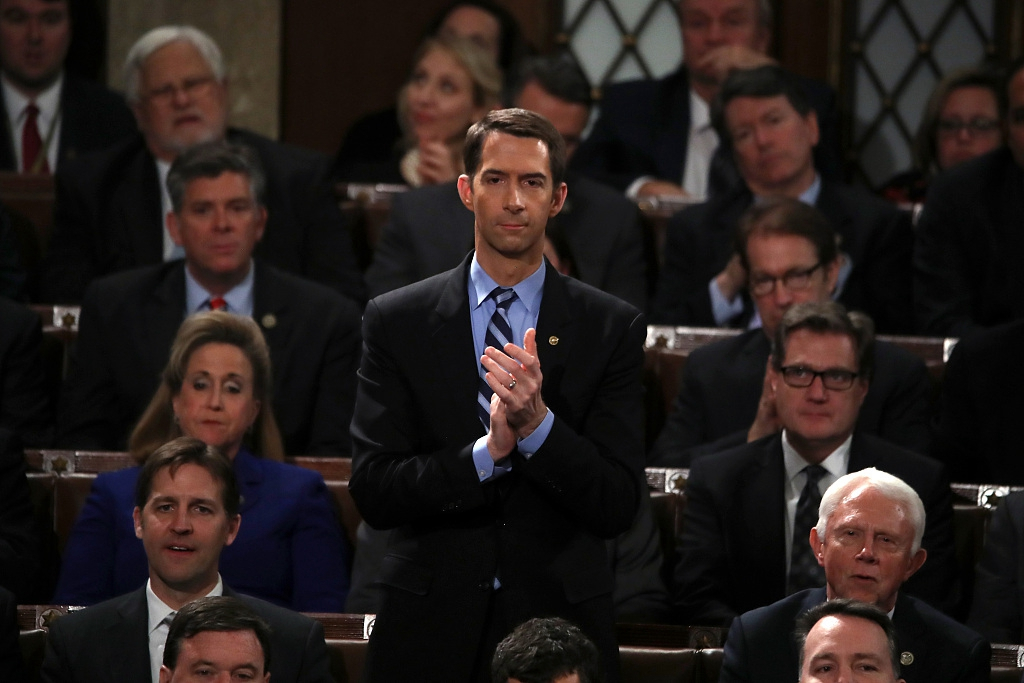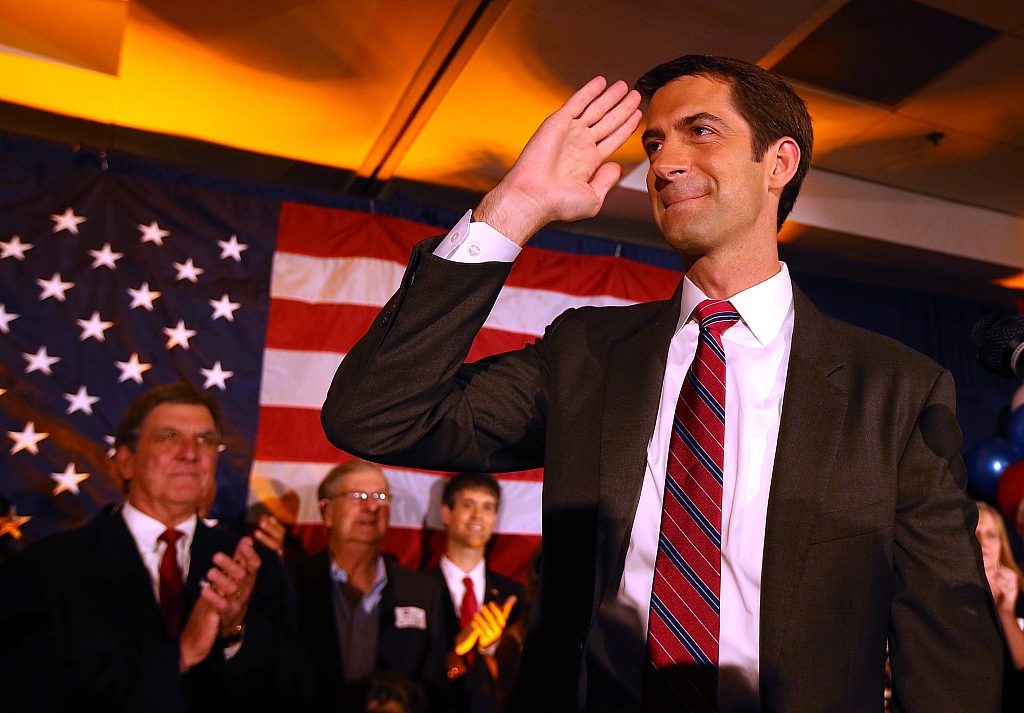
Tom Cotton is not who typically comes to mind when you think of a right-wing warmonger. The Republican Senator from Arkansas, a Harvard-educated army veteran, is a staunch ally of President Donald Trump. If his views, particularly those on foreign policy, are any indication of what to expect from Washington, it is a cause for concerns to say the least.
At 42, Cotton is the youngest legislator in the U.S. Senate. He was first elected at age 37 in 2014 while serving as a congressman representing his home district of Dardanelle in Arkansas. But for many in Washington and beyond, the freshman senator represents a step backward for American politics.

Senator Tom Cotton applauds during the State of the Union address in the chamber of the U.S. House of Representatives, Washington, D.C., January 30, 2018. /VCG Photo
A man made by wars
Cotton was finishing Harvard Law School to become a prosecutor at the time of the 9/11 attacks. After watching the live coverage of the 2001 attacks, he decided to give up a promising career in law and joined the U.S. Army. The following years saw the U.S. engaging in two major wars in Iraq and Afghanistan, and Cotton, who fought in both wars, was emerging as the face of American patriotism.
The military experience catapulted Cotton's political career. It was the centerpiece of his campaigns for both the Congress and the Senate, and something he still brings up at every opportunity. In 2012, the two-time veteran successfully ran to represent his home district in the U.S. Congress. Two years later, he aimed for the Senate.
During his Senate campaign, Cotton traded barbs with Democratic Senator Elizabeth Warren from Massachusetts, who was his former professor at Harvard. While acknowledging Cotton as an excellent student, Warren opposed his position on issues like women's rights, student loans and healthcare, and endorsed Cotton's Democratic rival, incumbent Senator Mark Pryor. But that did not stop Cotton from winning Arkansas in a landslide victory in 2014.

Rep. Tom Cotton salutes his supporters at his election watch party in North Little Rock, Arkansas, November 4, 2014. /AP Photo
Cotton's appeal to conservatives goes deeper than his well-publicized patriotism. He is a hardliner who makes the usual GOP hawks pale in comparison. And with veteran status to boot, Cotton is seen by the right as the antidote to the perceived weakness of the Obama Administration's domestic and foreign policies that they have been waiting for.
In 2015, just months after taking office, freshman senator Cotton made national headlines when he sent a letter to Iranian leaders, warning them that the Iran nuclear deal signed by former President Barack Obama would have no effect past his term. The letter, co-signed by 46 other Republican senators, drew a storm of criticism from home and abroad.
There were calls on social media to have Cotton and the other GOP senators charged for violating the Logan Act, which forbids unauthorized negotiations with foreign governments that undermine the U.S. government's position. But Cotton was adamant. He compared the Iran deal, which Trump would kill later, to President Neville Chamberlain's "appeasement" to Nazi Germany at the start of World War Two. Little did the opponents know that the infamous episode would be ominous for what was to come.
There are other troubling things Cotton and Trump have agreed on, such as waterboarding, an interrogation method deemed torture by the Geneva Convention and banned by Obama. Cotton claimed waterboarding wasn't torture, after Trump said that it "works." He also supported the opening of the Guantanamo Bay prison, which Obama had repeatedly promised to close.
If that's not enough evidence that Cotton shares Trump's love for strongman politics, the Arkansas senator was tipped as a favorite to succeed Mike Pompeo as the director of the Central Intelligence Agency and twice considered for the job of Secretary of Defense.
Foreign policy hell-raiser
Last month, Cotton grabbed the headline again after boasting that in the event of a war with Iran, the United States could easily win in "two strikes." However, this type of threats is perhaps not surprising given Cotton's history of warmongering.
The ex-military man has appeared to be hell-bent on starting another war in the Middle East. He notoriously argued that the U.S. Congress' vote to invade Iraq and Afghanistan in the aftermath of 9/11 would still apply to Syria after more than a decade.
"We need to bomb people over there to keep people safe over here..." Cotton said of the U.S. operation in Syria in a 2015 interview. And again at the 2016 Republican National Convention, he made the bold suggestion that the U.S. military should shoot down Russian planes that intervened on behalf of President Assad's government.

Senator Tom Cotton speaks at the Republican National Convention in Cleveland, Monday, July 18, 2016. /AP Photo
Cotton's obsession with wars is carried into his thinking on all international affairs. After China announced retaliatory tariffs following unsuccessful trade talks in May, Cotton told Americans that there will be sacrifice, but it is "pretty minimal" compared to the sacrifices made by American soldiers overseas. The comment was met with a wave of fury and disbelief from U.S. netizens and the media. Cotton's Democratic opponent Josh Mahony called the comparison "disgusting."
In his perpetually antagonist world view, Cotton has made China an all-around enemy with increasingly hostile rhetoric, including calling America's biggest trading partner a new "evil empire" – a phrase used by former President Ronald Reagan to describe the Soviet Union during the Cold War – that needs to be stopped.
He has led the ongoing crackdown on Chinese technology companies, along with Senator Marco Rubio, by introducing the Defending U.S. Government Communications Act in 2018, which bans the buying of equipment and services from Huawei, ZTE and their subsidiaries.
For the U.S. political establishment, Donald Trump is not the easiest president to work with. But Tom Cotton is a rare ally who is more than willing to play the bad guy standing by anything the president comes up next. With an exaggerated view of American interests and no problem with starting questionable wars, Cotton might just be the push needed for the White House to venture into dangerous territory.

Copyright © 2018 CGTN. Beijing ICP prepared NO.16065310-3
Copyright © 2018 CGTN. Beijing ICP prepared NO.16065310-3